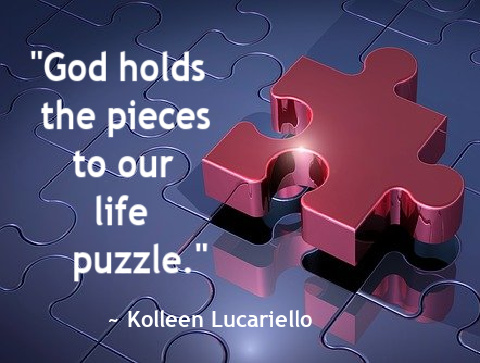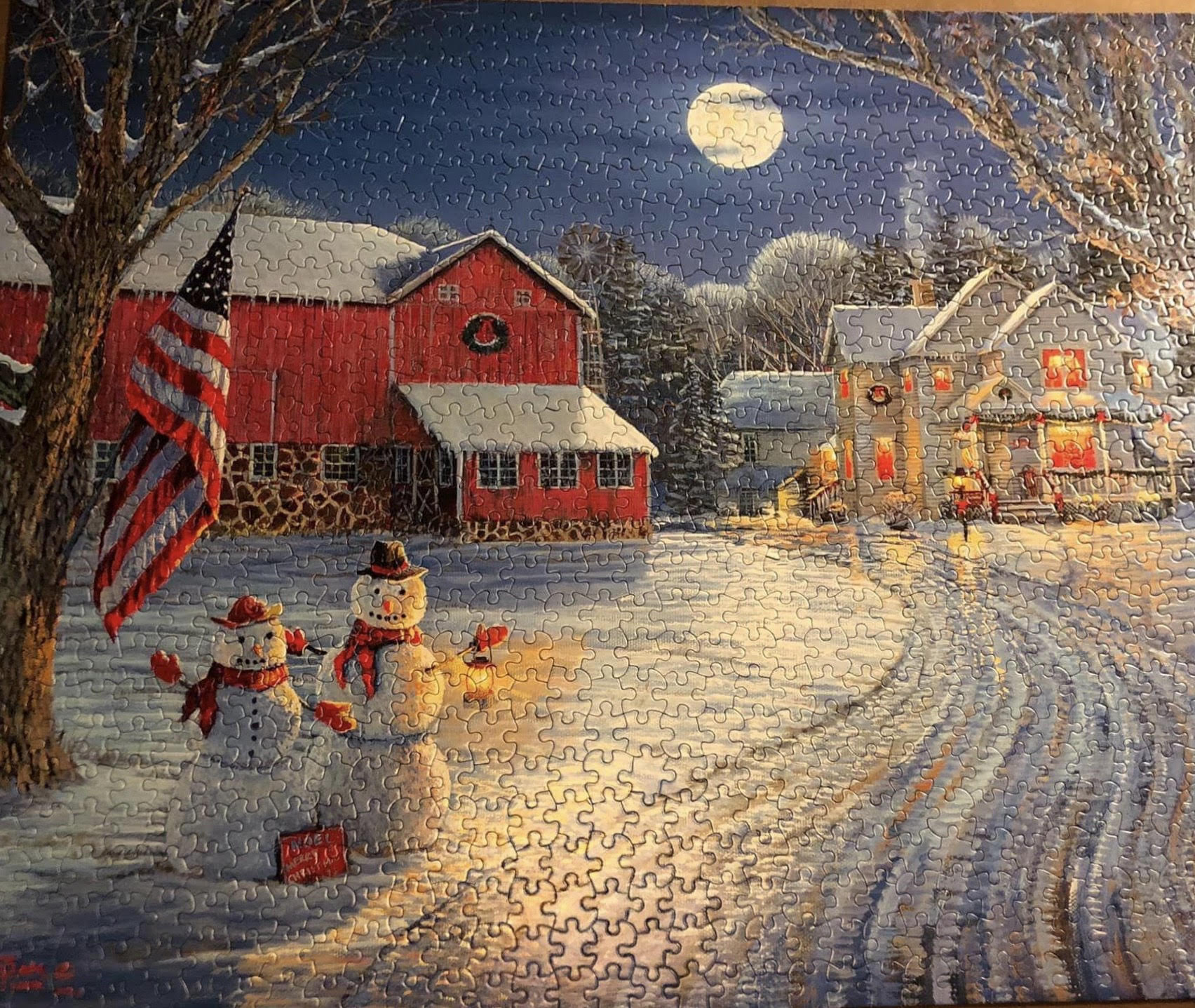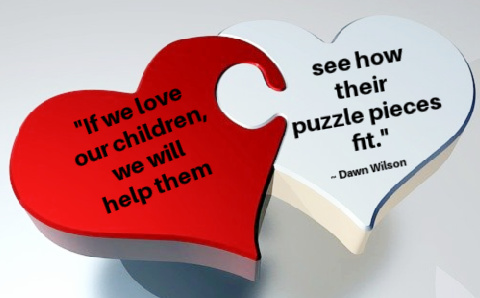When Life Has You Puzzled
Kolleen Lucariello's mind is a wonderful thing. Creative and inspiring, she approaches life with a unique spin on God's hand in our lives. In this Wisdom UPGRADE, she offers sound biblical truth for times when life has us puzzled.
 "My granddaughter held the box in her hands and asked, 'What do you say, Mimi? Want to do this puzzle with me?' Hesitation swelled within," Kolleen says, "when I saw which puzzle she held."
"My granddaughter held the box in her hands and asked, 'What do you say, Mimi? Want to do this puzzle with me?' Hesitation swelled within," Kolleen says, "when I saw which puzzle she held."
I (Dawn) love everything "puzzles," so Kolleen's title immediately drew me in. But her application stuck with me long after I read this post. I've been puzzled about something in my life, and I needed to hear her words.
Kolleen continues . . .
The puzzle contained 1,000 pieces and our time together was almost over; it would be impossible to complete before she left.
My face gave away my thoughts so she followed up with a “Puh-leeeeease?”
“Oh, alright. Let’s give it a try.”
I knew they’d be leaving soon and intended to throw it all back into the box once they walked out the door. However . . .
To my surprise, more family members decided to join in the puzzle fun. Soon, the outer edge was well on its way to completion. Then, with multiple pieces in place we heard, “Okay, kids; it’s time to go.”
After a short discussion on how to proceed, Papa and Mimi decided we’d come too far to take it all apart and throw it back into the box. So, we pressed on.
As we worked toward our goal to complete the puzzle, there were moments when the similarities between life and a puzzle became clearer to me than the piece I was looking for.
Life certainly can be puzzling sometimes, can’t it?
I lost count of how many times I’d scan and search for one particular piece for forever, only to have my puzzle partner stand over my shoulder, pick up the piece which was laying right in front of me, slide it in perfectly, chuckle and say, “You mean this one?”
And just like that the missing piece I’d spent an hour looking for was found.
It’s puzzling how quickly fresh eyes can pick out what has been staring at you but remained unseen.
Why couldn’t I see that?
We may wonder when another brings light to our blind spots. At the moment, it might also be a tad bit frustrating. But it’s valuable if progress is to be made.
Having my blind spots exposed is humbling. I prefer to believe I don’t have any, but I live knowing I do.
I’ve come to appreciate and value the way God uses others to help me see what I either can’t or, quite honestly, don’t want to.
As we pushed forward with our puzzle, I noticed how tempting it became to place a wrong-but-close piece into what seemed-like-it-should-go-there.
The puzzle was on our kitchen table for weeks.
We soon had a strong desire to git-r-done. This desire provoked a “close enough” attitude—numerous times. But, one misplaced piece led to several more and caused moments of backtracking when one would say, “That’s not right.” Sigh.
Things began to move along nicely after we began asking, “Do you think this piece goes here?”
Puzzle pieces were designed to fit where they were designed to fit. It doesn’t matter how hard you try, you can’t force the wrong piece in where it wasn’t intended to go.
Mistakes happen, but the greater tragedy is our refusal to admit them or seek advice in the hopes of limiting them.
A countless number of people are backtracking through their life story to find healing from wounds inflicted through mistakes and missteps. When we don’t know how to proceed, wisdom asks, “Do you think this piece goes here?”
Perhaps God would use our journey through Puzzle Park to bring an upgrade in a life that’s been puzzled by circumstance.
If that’s you, I’d like to offer you these two nuggets.
1. Walk in Wisdom
“The way of a fool is right in his own eyes, but a wise man listens to advice” or “Whoever trusts in his own mind is a fool, but he who walks in wisdom will be delivered” (Proverbs 12:15, 28 ESV).
Whether it is in our parenting, marriage, career, life-choices, or relationships: God used Solomon’s words to reveal the important role we play in the lives of others—to help uncover blind spots.
Only a fool would want to live blind and frustrated by what others can see.
2. Don't Give Up.
"And let us not grow weary of doing good, for in due season we will reap, if we do not give up”  (Galatians 6:9 ESV).
(Galatians 6:9 ESV).
When you’ve hit a snag and want to cater to the “close enough” attitude, please remember there is beauty in completing the work God set before you. Press on!
The puzzle we almost gave up on due to its difficulty is now framed for full display during the Christmas season.
God holds the pieces to our life puzzle.
- He knows the entirety of the plan He has for us.
- He’s aware when we’re stuck behind blind spots and has planned our way to clarity. We are wise to listen.
- He also knows when weariness is hindering our attitude to give our best effort. We are wise to ask for help.
So, when life has you puzzled, do you allow wisdom to lead the way?
Kolleen Lucariello, #TheABCGirl, is the author of #beYOU: Change Your Identity One Letter at a Time and is the Co-Director of Activ8Her, Inc. She is passionate to every woman realize her identity in Christ and live accordingly. Kolleen and her hubby, Pat, make their home in Central New York. She’s the mom of three grown children and Mimi to six incredible grands. For more information about Kolleen, visit www.speakkolleen.com
 Post a Comment → Posted on
Post a Comment → Posted on  Thursday, February 17, 2022 at 9:40AM
Thursday, February 17, 2022 at 9:40AM  Advice,
Advice,  Blind Spots,
Blind Spots,  Don't Give Up,
Don't Give Up,  Kolleen Luciarello,
Kolleen Luciarello,  Perseverance,
Perseverance,  Persistence,
Persistence,  Puzzle,
Puzzle,  Puzzle Pieces,
Puzzle Pieces,  Puzzled,
Puzzled,  Upgrade with Dawn,
Upgrade with Dawn,  Walk in Wisdom,
Walk in Wisdom,  Wisdom Upgrade Your Life
Wisdom Upgrade Your Life  Perseverance,
Perseverance,  Wisdom
Wisdom 





